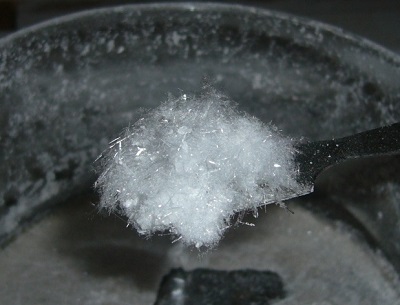M
mrsam
Guest
Benzoic acid is a colorless crystalline solid and a simple aromatic carboxylic acid. The name is derived from gum benzoin, which was for a long time its only known source.
The substance was part of the major case in the recent judgement directed the National Agency for Food Drug Administration and Control (NAFDAC) to mandate the Nigeria Bottling Company (NBC) to include a warning on its bottles of Fanta and Sprite that its contents cannot be taken with Vitamin C as same become poisonous if taken with Vitamin C.
This order was premised on the fact that the products contain the preservative, benzoic acid.
However, the NBC has since appealed this order.
Several studies including the International Agency for Research on Cancer (IARC) of the World Health Organisation (WHO) have confirmed that soft drinks containing a mixture of the salt of benzoic acid, sodium benzoate and vitamin C can cause cancer and other chronic conditions.
1. Benzoic acid was first obtained from the resin of trees belonging to the Styrax genus. The fragrant resin smells like vanilla and is sometimes known as gum benzoin. In the present day, benzoic acid is produced in the lab from other chemicals instead of being extracted from gum benzoin.
2. Benzoic acid is a white, crystalline powder with a faint, non-offensive odour.

3. Benzoic acid is used to manufacture a wide variety of products such as perfumes, dyes, topical medications and insect repellents.
Trending: NAFDAC Appeals Ruling Declaring Fanta, Sprite Poisonous With Vitamin C
4. Benzoic acids are common additives to food, drinks and other products. They are useful chemicals in manufactured products because they kill or inhibit both bacteria and fungi and can act as preservatives.
5. Benzoates are derived from benzoic acid and are more commonly used as food preservatives than the acid. When the chemical reacts with vitamin C (ascorbic acid) in drinks under certain conditions, benzene may be produced. Benzene is a carcinogen. A carcinogen is a substance that is capable of causing cancer.
6. Most people don't need to worry about benzoic acid and benzoates in food, drinks and other sources, since the chemicals are usually present in small amounts. However, for safety sake, you should try as much as possible to reduce your exposure to benzoic acid and benzoates since high levels are potentially dangerous
The substance was part of the major case in the recent judgement directed the National Agency for Food Drug Administration and Control (NAFDAC) to mandate the Nigeria Bottling Company (NBC) to include a warning on its bottles of Fanta and Sprite that its contents cannot be taken with Vitamin C as same become poisonous if taken with Vitamin C.
This order was premised on the fact that the products contain the preservative, benzoic acid.
However, the NBC has since appealed this order.
Several studies including the International Agency for Research on Cancer (IARC) of the World Health Organisation (WHO) have confirmed that soft drinks containing a mixture of the salt of benzoic acid, sodium benzoate and vitamin C can cause cancer and other chronic conditions.
1. Benzoic acid was first obtained from the resin of trees belonging to the Styrax genus. The fragrant resin smells like vanilla and is sometimes known as gum benzoin. In the present day, benzoic acid is produced in the lab from other chemicals instead of being extracted from gum benzoin.
2. Benzoic acid is a white, crystalline powder with a faint, non-offensive odour.

3. Benzoic acid is used to manufacture a wide variety of products such as perfumes, dyes, topical medications and insect repellents.
Trending: NAFDAC Appeals Ruling Declaring Fanta, Sprite Poisonous With Vitamin C
4. Benzoic acids are common additives to food, drinks and other products. They are useful chemicals in manufactured products because they kill or inhibit both bacteria and fungi and can act as preservatives.
5. Benzoates are derived from benzoic acid and are more commonly used as food preservatives than the acid. When the chemical reacts with vitamin C (ascorbic acid) in drinks under certain conditions, benzene may be produced. Benzene is a carcinogen. A carcinogen is a substance that is capable of causing cancer.
6. Most people don't need to worry about benzoic acid and benzoates in food, drinks and other sources, since the chemicals are usually present in small amounts. However, for safety sake, you should try as much as possible to reduce your exposure to benzoic acid and benzoates since high levels are potentially dangerous
Last edited by a moderator:

